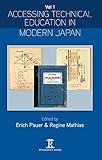Accessing Technical Education in Modern Japan / ed. by Erich Pauer, Regine Mathias.
Material type: TextPublisher: Amsterdam : Amsterdam University Press, [2022]Copyright date: ©2022Description: 1 online resource (580 p.)Content type:
TextPublisher: Amsterdam : Amsterdam University Press, [2022]Copyright date: ©2022Description: 1 online resource (580 p.)Content type: - 9781912961269
- Technical education -- Congresses -- History -- Japan
- Technical education -- Japan -- History -- Congresses
- Asian Studies
- Contemporary History
- East Asia and North East Asia
- History of education
- History of engineering and technology
- Science and Technology
- EDUCATION / Teaching Methods & Materials / Science & Technology
- cotton spinning
- education
- engineering
- mining
- textbooks
- 373.2460952 23/eng/20220810
- LC1047.J3 A23 2022
- online - DeGruyter
| Item type | Current library | Call number | URL | Status | Notes | Barcode | |
|---|---|---|---|---|---|---|---|
 eBook
eBook
|
Biblioteca "Angelicum" Pont. Univ. S.Tommaso d'Aquino Nuvola online | online - DeGruyter (Browse shelf(Opens below)) | Online access | Not for loan (Accesso limitato) | Accesso per gli utenti autorizzati / Access for authorized users | (dgr)9781912961269 |
Frontmatter -- Contents -- Acknowledgements -- Editors’ Notes on Translation -- Introduction. Books, Craftsmen and Engineers: The Emergence of a Formalized Technical Education in a Modern Science-based Education System -- VOLUME I -- 1 The Translation of Technical Manuals from Western Languages in Nineteenth-century Japan: A Visual Tour -- 2 The Translation of Western Books on Natural Science and Technology in China and Japan: Early Conceptions of Electricity -- 3 Creating Intellectual Space for West–East and East–East Knowledge Transfer: Global Mining Literacy and the Evolution of Textbooks on Mining in Late Qing China, 1860–1911 -- 4 François Léonce Verny and the Beginning of ‘Modern’ Technical Education in Japan -- 5 The Role of the Ministry of Public Works in Designing Engineering Education in Meiji Japan: Reconsidering the Foundation of the Imperial College of Engineering (Kobu-dai-gakko) -- 6 From Student of Confucianism to Hands-on Engineer: The Case of Ohara Junnosuke, Mining Engineer -- 7 The Fall of the Imperial College of Engineering: From the Imperial College of Engineering (Kobu-dai-gakko) to the Faculty of Engineering at Imperial University, 1886 -- VOLUME II -- 8. Kikuchi Kyozo and the Implementation of Cottonspinning Technology: The Career of a Graduate of the Imperial College of Engineering -- 9 The Training School for Railway Engineers: An Early Example of an Intra-firm Vocational School in Japan -- 10 Training and Education of Female Silk-reeling Instructors in Meiji Japan -- 11 The Establishment and Curriculum of the Tokyo Shokko -gakko (Tokyo Vocational School) in Meiji Japan -- 12 The Development of Mining Schools in Japan -- 13 Science Education in Japanese Schools in the Late 1880s as Reflected in Students’ Notes -- 14 Education in Mechanical Engineering in Early Universities and the Role of Their Graduates in Japan’s Industrial Revolution: The University of Tokyo , the Imperial College of Engineering and the Imperial University -- List of Contributors -- Index
restricted access online access with authorization star
http://purl.org/coar/access_right/c_16ec
This collection of fourteen key papers deriving from CEEJA’s second international conference exploring the Japanese history of technology, concentrates on the routes to acquiring and transmitting technical knowledge in Japan’s modern era – from the very earliest endeavours in establishing opportunities for acquiring a technical education to the translation of foreign textbooks and manuals. Published in two volumes and thematically structured in three Parts, this wide-ranging work both complements and expands on the subject-matter contained in the first volume entitled Technical Knowledge in Early Modern Japan (2020). Part I includes ‘François Léonce Verny and the Beginning of the “Modern” Technical Education in Japan’, by NISHIYAMA Takahiro; ‘The Role of the Ministry of Industry in Designing Engineering Education in Meiji Japan’ by WADA Masanori; ‘From Confucianism to Modern Technical Studies: Studying Mining at the Imperial College of Engineering (K?bu-dai-gakk?)’ by Erich Pauer. ‘ Part II includes ‘Education of Female Silk Reeling Instructors in the Meiji Period’ by SASHINAMI Akiko; ‘Kikuchi Ky?z? and the Implementation of Cotton Spinning Technology’ by Janet Hunter; ‘The Establishment and Curriculum of the Industrial Schools (shokko gakk?) in Meiji Japan’ by TODA Kiyoko. Part III includes ‘Transfer of Technology via Technical Textbooks: From the West to China and Japan’ by CHEN Hailian; ‘Translation of European Books on Natural Sciences and Technology in China’ by Christine MOLLMURATA; ‘Translation of Foreign Textbooks for Education in Japan’ by Ruselle Meade.
Mode of access: Internet via World Wide Web.
In English.
Description based on online resource; title from PDF title page (publisher's Web site, viewed 01. Dez 2022)


